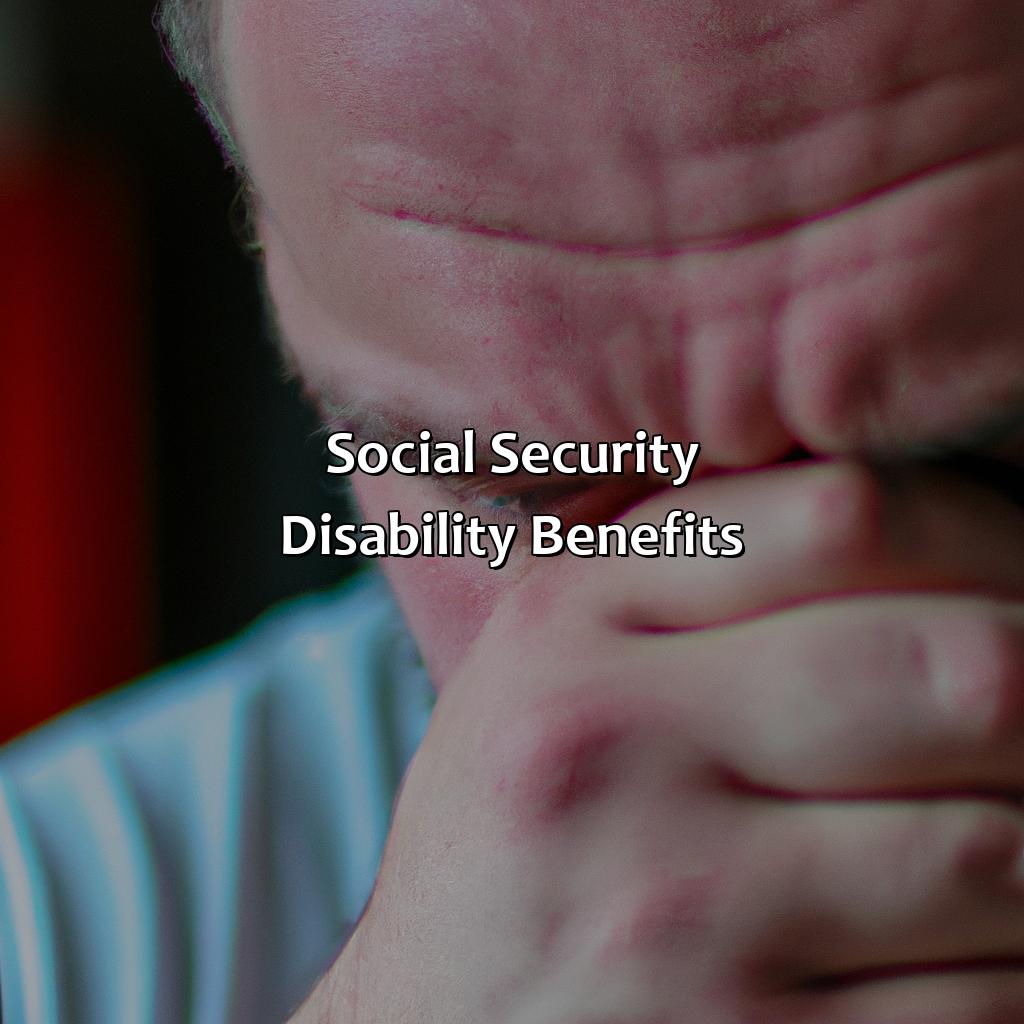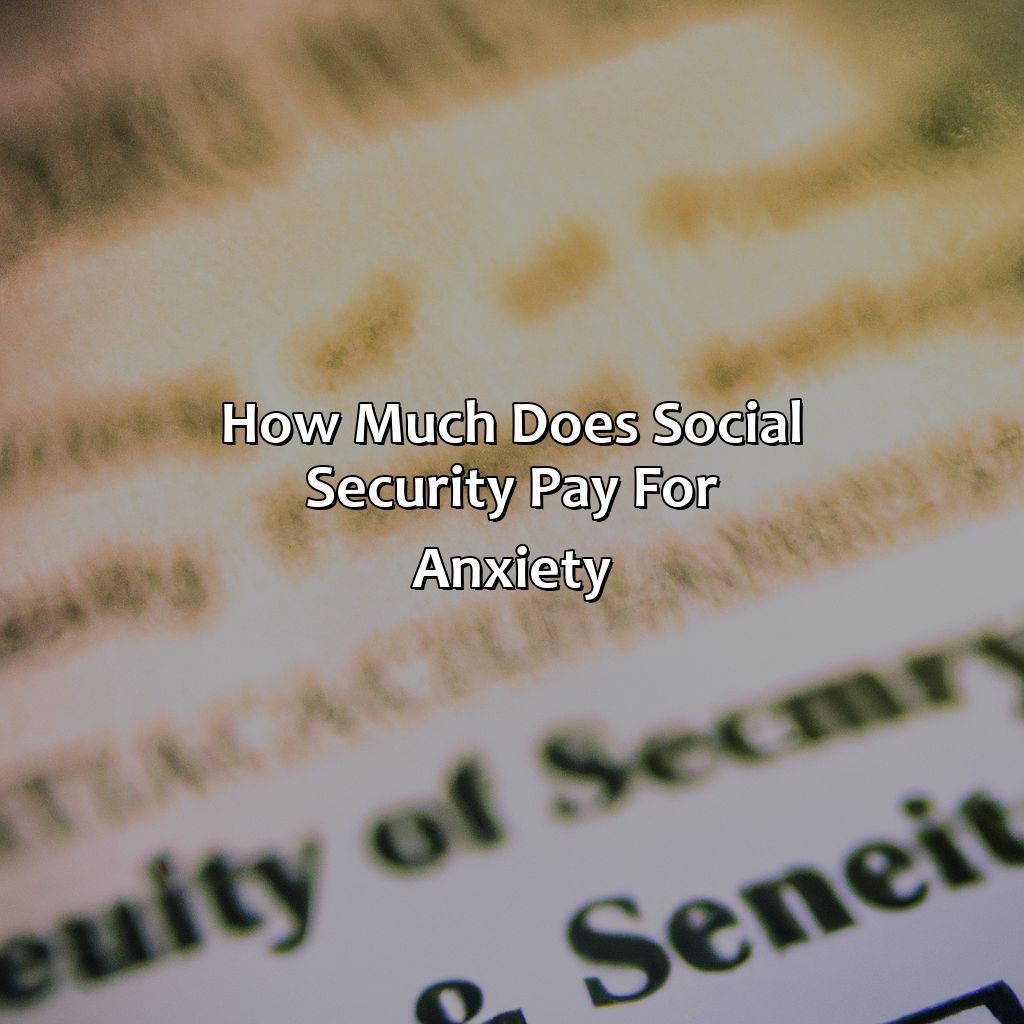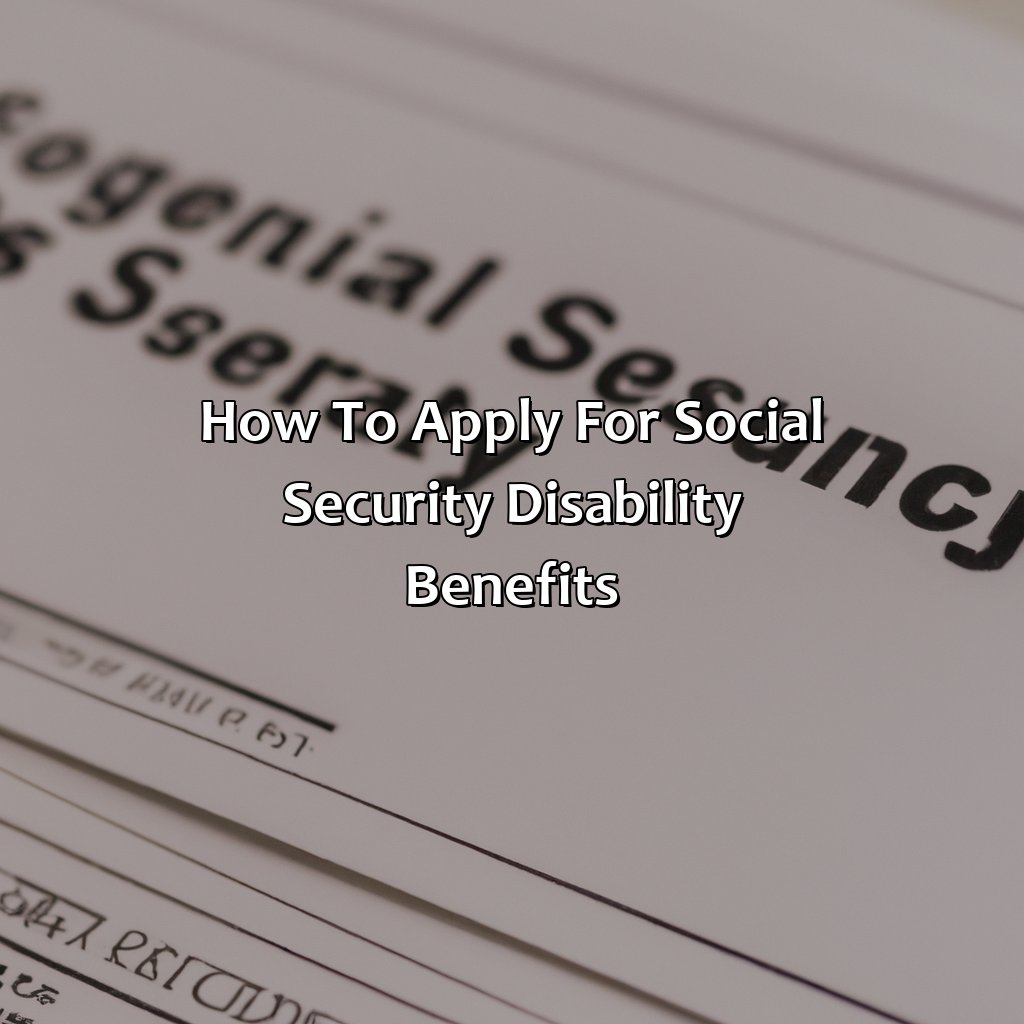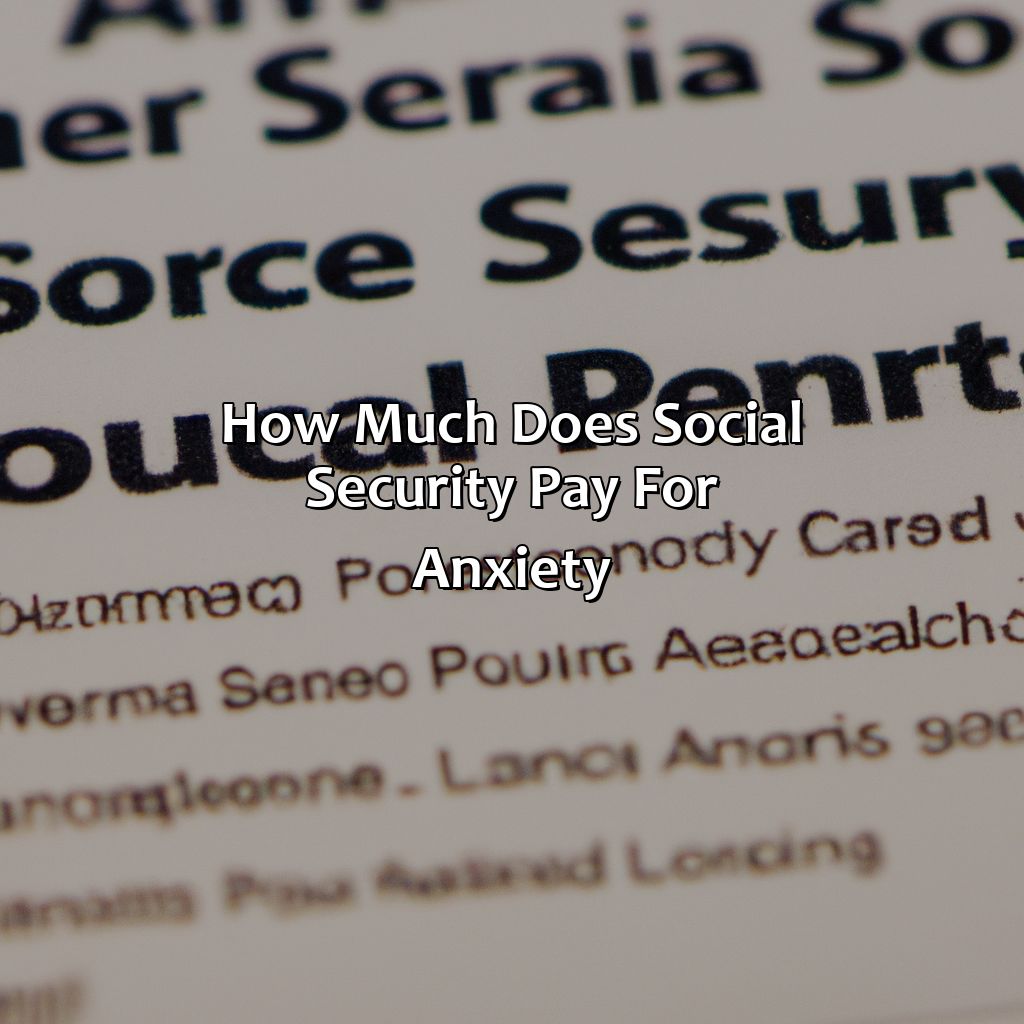How Much Does Social Security Pay For Anxiety?
Key Takeaways:
- Individuals with anxiety disorders may be eligible for Social Security Disability Benefits, which can help provide financial assistance to those who cannot work due to their condition.
- The amount of Social Security Disability Benefits paid for anxiety disorders varies depending on various factors, including the severity of the anxiety disorder, the individual’s work history, and other medical conditions they may have.
- The average monthly payment for Social Security Disability Benefits for anxiety disorders is around $1,100, but can range from $700 to $1,300 depending on individual circumstances.
Are you feeling overwhelmed by your anxiety and uncertain about your social security benefits? You’re not alone. In this article, we will discuss how social security can help ease the burden of anxiety and provide financial security.
Social Security Disability Benefits
Are you eligible for Social Security Disability Benefits? Find out, including the criteria for anxiety disorders! This section will cover two sub-sections. Each one will help those asking how much they can get from Social Security for their anxiety.

Image credits: retiregenz.com by Adam Duncun
Eligibility for Social Security Disability Benefits
Individuals with qualifying disabilities can receive Social Security Disability Benefits, which is a financial support system provided by the Social Security Administration. These benefits are only available to those who meet specific eligibility requirements and pass through the application process. Eligibility for Social Security Disability Benefits is determined by evaluating an individual’s medical records, work history, and age, among other factors.
If a person’s physical or mental condition prevents them from working for a year or more or have been diagnosed with specific medical conditions listed in the Blue Book, they may be eligible for these benefits.
To establish eligibility, claimants must prove that their disability prevents them from engaging in work activities that are substantial gainful activity (SGA). The administration will examine if the condition meets the severity criteria set forth in the Listing of Impairments found in the Blue Book which contains impairments that could limit a person’s ability to do substantial gainful activity. If not found on this list, it must be evaluated to determine whether it equals one of those listed.
It’s important to note that receiving disability payments does not mean that an individual cannot perform any job-related activities at all; instead, it means they cannot engage in “substantial gainful activity”. There are caps on how much monthly income an applicant can receive while still being deemed eligible. Thus qualifying individuals will receive roughly 40% of their average lifetime earnings before becoming disabled.
For instance, Joan suffers from chronic panic attacks and anxiety disorders that make it impossible for her to complete tasks required to hold consistent employment. The SSA approved her application after initial rejection based on satisfying requirements meant to determine if she met specific eligibility criteria – thereby providing her with a safety net during stressful times while ensuring continuous support throughout her life upon meeting all subsequent needs as well.
Anxiety is the one disorder where being constantly worried about being eligible for disability benefits is actually a symptom.
Eligibility for Anxiety Disorders
Individuals who suffer from Anxiety Disorders may be eligible for Social Security Disability Benefits. The eligibility criteria vary depending on the severity of the disorder and its potential impact on daily activities. Medical documentation, diagnosis and individual functioning will be evaluated to determine eligibility for benefits.
To qualify for Social Security Disability Benefits due to an Anxiety Disorder, the condition must meet certain criteria set by the Social Security Administration. These criteria include proof of a medical diagnosis, evidence that the anxiety disorder significantly impairs the claimant’s functioning, and documentation stating that this impairment is expected to last for at least a year or result in death.
It is important to note that several types of anxiety disorders exist, such as Generalized Anxiety Disorder (GAD), Panic Disorder, Obsessive-Compulsive Disorder (OCD), Social Anxiety Disorder (SAD) and Post-Traumatic Stress Disorder (PTSD). Each type has specific symptoms which could make it more or less severe than other types of anxiety disorders.
Moreover, individuals who suffer from anxiety disorders face different challenges when seeking social security benefits; some even end up being denied despite having legitimate claims. For example, consider Ms. A who had been hospitalized two times due to her severe GAD but her claim was initially rejected because she was not determined disabled enough. After appealing the decision and providing additional medical documentation showing clear functional limitations imposed by her disorder, she was finally approved for disability benefits.
How much does Social Security pay for anxiety? Not enough to cover the cost of therapy, but enough to make you anxious about how you’re going to pay for it.
How Much Does Social Security Pay for Anxiety?
To figure out how much Social Security pays for anxiety disorders, you must look at various aspects. To help you better grasp this, this section has two subsections:
- Determining the Amount of Benefits
- Average Monthly Social Security Disability Payment for Anxiety Disorders
These will give you insight into what affects the payment and how much you can expect to receive.

Image credits: retiregenz.com by David Woodhock
Determining the Amount of Benefits
When it comes to determining the amount of benefits for anxiety under Social Security, there are certain key factors taken into consideration. These include the severity and duration of the medical condition, and the individual’s working history and financial records. Below are some crucial points to keep in mind.
– Medical Evidence: One primary aspect that determines benefits is the extent of medical evidence provided by the claimant, including doctor’s notes, test results, and other relevant information. The Social Security Administration evaluates this evidence based on its consistency with accepted medical criteria.
– Work History: The second determinant is a person’s work history based on their Social Security earnings record. A benefit formula takes into account an average from an individual’s highest earning years throughout their working career.
– Financial Records: Finally, any other income or resources also affect how much one can receive through disability payments as part of their social security benefits package.
In addition to all these factors, it’s important to keep in mind that each applicant’s case is unique. While certain requirements must be met to qualify for benefits, individual circumstances may influence the exact amount of assistance that one receives.
If you think you might be eligible for social security benefits due to anxiety or any other medical condition, it’s important to seek professional advice and guidance promptly. Waiting too long could mean missing out on valuable assistance when you need it most.
Anxiety may be free to worry about, but unfortunately, Social Security disability payments for it are not.
Average Monthly Social Security Disability Payment for Anxiety Disorders
Social Security Disability Payment for Anxiety Disorders varies depending on several factors. However, the average monthly payout ranges from $800 to $1,800. The assessment combines physical and psychological symptoms, medical history, and how much the illness affects the person’s everyday life.
| Severity | Average Monthly Payment |
| Mild | $800 – $1,000 |
| Moderate | $1,000 – $1,200 |
| Severe | $1,300 – $1,800 |
It is essential to note that even with a severe anxiety disorder, an individual may not qualify for disability payment if they can still complete work-related tasks.
Anxiety disorders affect people in various ways; therefore, disability payments are determined based on individual circumstances.
A successful story of a person receiving Social Security Disability Payments for their anxiety disorder is Mrs B. She underwent numerous tests before her Social Security Disability Insurance application was approved. After many consultations and assessments with different specialists and therapists over two years of preventive medication treatments without success, she finally got approval for her Social Security claim.
Ready to navigate the bureaucratic maze of Social Security? It’s like a game of Mario Kart, but instead of power-ups, you collect medical records and doctor’s notes.
How to Apply for Social Security Disability Benefits
For applying Social Security Disability benefits with an emphasis on anxiety, you must follow certain steps. Additionally, you must submit the needed medical documents. This section will guide you through the process, introducing the subsections – Steps to Apply for Social Security Disability Benefits and Required Medical Documents to Apply for Social Security Disability Benefits.

Image credits: retiregenz.com by Harry Jones
Steps to Apply for Social Security Disability Benefits
The process of securing Social Security Disability Benefits can seem daunting, but it is achievable if you follow the correct steps. The application process starts by gathering documents and medical evidence, then submitting them to the Social Security Administration (SSA) for review.
Here are five steps to help you apply for Social Security Disability Benefits:
- Find out if you’re eligible by reviewing the SSA’s criteria.
- Complete your application online or in-person at a local SSA office.
- Submit any necessary documentation, including medical records and work history.
- Meet with a doctor for a medical evaluation if required by the SSA.
- Await a decision from the SSA regarding your benefits claim.
It is important to note that each step of the application process requires attention to detail and thoroughness. Meeting all requirements and deadlines will increase your chances of approval.
Regarding anxiety disorders specifically, Social Security disability benefits can be granted based on an individual’s symptoms, severity of diagnosis, and inability to perform daily activities due to their condition.
If you are struggling with a severe anxiety disorder that prevents you from working, do not hesitate to explore available resources like Social Security Disability Benefits. Time is critical in securing these benefits, and inaction could result in missed opportunities for financial assistance. Take charge of your health and finances by applying for disability benefits today.
Better start collecting medical records like they’re Pokémon cards if you want to apply for Social Security Disability Benefits.
Required Medical Documents to Apply for Social Security Disability Benefits
Requisite Medical Papers for Requesting Government Assistance on Disability Claims
Government-aided disability claims require specific papers that verify and support the claimant’s medical condition. The requisites determine the approval or rejection of an individual’s eligibility for disability financial aid.
The following are mandatory documents when applying for Social Security Disability Benefits:
- Medical reports from a licensed health provider on the claimant’s diagnosis, symptoms, and treatment regimen
- Laboratory tests results that are applicable to the claimant’s illness
- Hospital admission records related to present or previous hospitalization due to their disability
Supplementary copies of relevant documents may be required for disability evaluation depending on the severity of their medical condition and its effect on daily living activities.
Some Facts About How Much Does Social Security Pay For Anxiety:
- ✅ The Social Security Administration does not have a specific disability listing for anxiety disorders. (Source: Social Security Administration)
- ✅ However, individuals with severe anxiety may qualify for Social Security Disability Insurance (SSDI) or Supplemental Security Income (SSI) benefits if their condition meets certain criteria. (Source: Disability Benefits Center)
- ✅ To qualify for SSDI, an individual must have worked enough to earn sufficient work credits, while SSI eligibility is based on financial need. (Source: The Balance)
- ✅ The amount of monthly disability benefits received depends on several factors, including the individual’s work history and income, as well as their specific impairment. (Source: Disability Benefits Help)
- ✅ It can be challenging to get approved for SSDI or SSI benefits for anxiety, and individuals may need to seek assistance from an experienced Social Security disability attorney. (Source: DisabilitySecrets)
FAQs about How Much Does Social Security Pay For Anxiety?
How much does social security pay for anxiety?
The amount of social security payments for individuals with anxiety disorders can vary and is dependent upon several factors. The severity of the disorder, the ability to work, and the number of years worked are all taken into consideration when determining the payment amount.
Can I get social security payments for anxiety?
Yes, individuals with severe anxiety disorders that prevent them from working may be eligible for social security payments under the category of mental illness. However, a thorough evaluation of medical history and work eligibility will be required before qualification is determined.
What documentation is needed for social security payments for anxiety?
Documentation required for social security payments for anxiety includes medical records detailing the disorder and its severity, work history, and income verification. Additional documentation may be necessary and can vary based on individual circumstances.
Do I need an attorney for social security payments for anxiety?
While an attorney is not required for social security payments related to anxiety disorders, it is often beneficial to have one as the process can be complex and time-consuming. An attorney can help ensure that all necessary documentation is submitted, deadlines are met, and the best possible outcome is achieved.
What is the process for applying for social security payments for anxiety?
The process for applying for social security payments for anxiety involves completion of an application, submission of necessary documentation, and a thorough evaluation of medical history and work eligibility. A decision will then be made regarding eligibility and payment amount.
Are there any alternative options for financial assistance for those with anxiety disorders?
Yes, there are alternative options for financial assistance for those with anxiety disorders such as disability insurance, worker’s compensation, and state-funded programs. It is important to research and explore all options to determine which is the most suitable for individual needs.
